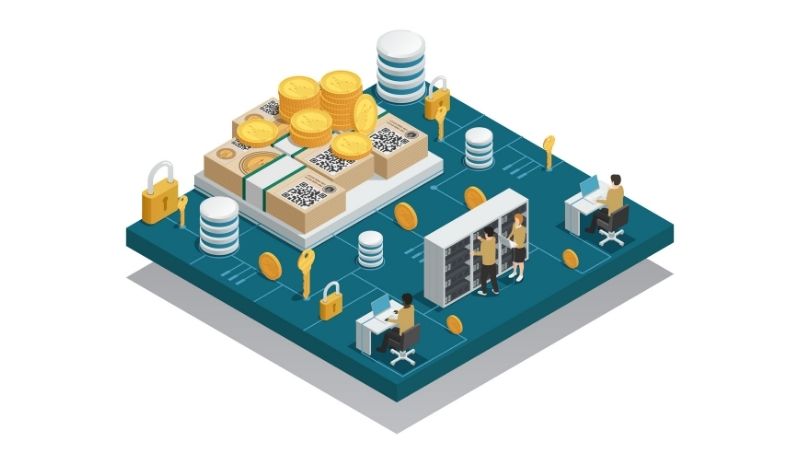
There is a term that is often heard while wandering around the cryptocurrency world: Altcoin. So, what is an altcoin and why is it so popular? Are these digital assets just alternatives or are they revolutionizing the cryptocurrency market?
All cryptocurrencies except Bitcoin It is called altcoin. Each entity in this category has a unique purpose and technology. The diversity of altcoins makes the world of cryptocurrency an exciting adventure. Because every new altcoin may represent a potential opportunity and new technologies of the future. Then let’s open the door to the magical world of altcoins.
What is Altcoin Mean?

Altcoin refers to all cryptocurrencies created after Bitcoin. ‘Alternative Coin’ Altcoin, which is short for the expression, covers all cryptocurrencies created as an alternative to Bitcoin, as can be inferred from its name. Therefore, “Is Bitcoin an altcoin?” When looked at, this question can be clearly answered as “No”. Each altcoin operates according to its own rules and each has different or similar purposes.
What is the First Altcoin?
first altcoin It went down in history as Namecoin. This project, which emerged three years after Bitcoin, that is, in April 2011, laid the foundation for the alcoins that came after it. The second altcoin is known as Litecoin. Although Litecoin was created from the source code of Bitcoin, its emergence in October 2011 places it second in the history of the emergence of altcoins.
How Do Altcoins Work?

Altcoins are often developed as alternatives to certain limitations or drawbacks of Bitcoin. However, it brings with it some advantages and disadvantages. Let’s look at these:
Advantages of Altcoins
Some advantages of altcoins may be as follows:
- Technological Innovation: Some altcoins aim to offer more advanced features using blockchain and cryptography, Bitcoin’s core technology. For example, altcoins such as Ethereum that support smart contracts enable more complex and programmable transactions.
- Scalability: Bitcoin may not meet expectations in terms of transaction speed and scalability. Therefore, some altcoins have been developed to provide faster transaction confirmations or support greater transaction volume.
- Different Mining Algorithms: Bitcoin’s mining process can result in high energy consumption and hardware requirements. Some altcoins use different mining algorithms to solve these problems or reduce environmental impact.
- Diversity and Specialization: Altcoins can differentiate themselves from Bitcoin by focusing on different use cases or industry-specific requirements. For example, Ripple (XRP) is designed for interbank payments, while Monero (XMR) is a privacy-focused cryptocurrency project.
- Community Needs and Preferences: The cryptocurrency community is interested in a variety of projects that support different features and philosophies. Therefore, different altcoins are created to meet community needs and preferences.
- Lower Fees: The high transaction fees experienced with Bitcoin may be a concern for some users. Some altcoins try to solve this problem by offering lower transaction fees.
- Volatility and Investment Opportunities: Altcoins are generally more volatile than Bitcoin and can experience greater price fluctuations. This can present a variety of trading and investment opportunities for investors.
These advantages enable altcoins to play an important role in the cryptocurrency ecosystem and provide various benefits for users. Considering all these reasons, the question ” Why did Altcoins emerge?” The question is also answered. Altcoins often meet investors as an innovative and diverse part of the cryptocurrency ecosystem. However, each altcoin has its own risks and disadvantages. Therefore, it is important to conduct careful research before investing.
Disadvantages of Altcoins
Some disadvantages of altcoins may be:
- Less Liquidity and Reliability: Compared to Bitcoin, altcoins generally retain less liquidity and user base. This may cause altcoins to be more affected by market fluctuations and price manipulations, making them less reliable.
- Technological Issues and Security Risks: Some altcoins may be still in development or have a limited user base. This may lead to technical errors and security vulnerabilities.
- Less Adoption and Integration: Adoption and acceptance of Bitcoin is generally higher compared to altcoins. This may pose a certain obstacle to the real-world use and integration of altcoins.
- Fraud Potential: Altcoins may be more susceptible to fraud due to their lower volume and liquidity. Especially altcoins with low market capitalization, ‘ pump’ oath They can pave the way for manipulative operations such as ‘dump ‘.
- Technological Differences and Standards: Different altcoins use different blockchain technologies and standards. This can make it difficult to effectively interact or interoperate between different altcoins.
These drawbacks indicate the risks and challenges of altcoins. Investors and users should conduct careful research and consider risks to understand and evaluate altcoins.
What is Altcoin Used for?

These digital currencies, which emerged as alternatives to Bitcoin, have different features or purposes of use. You can take a look at the following articles about what altcoins are generally used for:
- Variation: Altcoins may have different features based on different technologies. While some introduce different features by changing Bitcoin’s underlying protocol, others make use of completely different blockchain technologies.
- Innovation: Altcoins can create an environment where new technologies and innovative ideas are tested. Some offer features like faster transaction confirmations, better privacy or stronger security.
- Customize: Altcoins can address specific needs by focusing on a specific sector or use case. For example, some are designed to facilitate smart contracts, some can be used for tokenization, and some can address specific data security requirements.
- Investment and Trade: Altcoins provide investors with the opportunity to invest and trade in assets other than Bitcoin. This can allow for diversification and be a useful option for those looking to pursue different investment strategies.
What are the Altcoin Types?

Altcoins fall under different categories and the number of these categories is quite high. Some popular altcoin types are as follows.
Exchange Based: These are the types of cryptocurrencies issued by cryptocurrency exchanges. Those who own these cryptocurrencies are provided with some advantages such as commission discounts, service usage and so on on these platforms. For example: ICRYPEX Token (ICPX), BNB (BNG) and GateToken (GT).
Stablecoin : Cryptocurrencies whose prices are usually pegged to a fiat currency. For example: Tether (USDT), USD Coin (USDC) and TrueUSD (TUSD).
Privacy: Cryptocurrencies that use special technologies to hide users’ transactions. For example: Monero (XMR) and Zcash (ZEC).
DeFi ( Decentralized Finance): Cryptocurrencies that support decentralized financial applications ( DeFi ). For example, Aave (AAVE) and Compound (COMP).
NFT ( Non-Fungible Token ): Cryptocurrencies that represent unique digital assets. For example: ApeCoin (APE), Axie Such as Infinity (AXS), Illuvium (ILV).
Artificial Intelligence : These are the types of cryptocurrencies used in the operation of artificial intelligence projects. For example: Fetch.ai. (FET), Render (RNDR), The Like Graph (GRT).
The cryptocurrency ecosystem constantly evolves with new types and new projects. That’s why the types of cryptocurrencies that we consider popular today may lose their popularity tomorrow. For exactly this reason, it is unlikely that this list will remain constant.
What Depends on the Rise of Altcoins?

Altcoin prices depends on many factors. The most well-known of these factors are as follows:
- Bitcoin Price: Bitcoin is generally considered the determinant of the crypto market. If the price of Bitcoin increases, the prices of altcoins usually increase as well.
- General Market Interest: General interest and demand for cryptocurrencies also affects altcoin prices. If the demand for cryptocurrencies increases, altcoins may also be positively affected by this increase.
- Technological Developments and News: If an altcoin experiences a technological innovation or positive news, its price may increase. For example, if an altcoin releases a new product, signs a major collaboration, or makes an important update, it may attract the attention of investors and increase its price.
- Project Fundamentals: Factors such as the altcoin’s core values, project team, technology, use case, and adoption rate can positively impact its long-term price performance. Altcoins with a strong foundation can have more stable price performance.
- Market Speculation and Manipulation: The crypto market is susceptible to speculation and manipulation. Manipulative transactions or speculative behavior may bring about short-term price fluctuations and sudden price increases.
- Regulations and Legal Status: The legal status and regulations of cryptocurrencies can have a significant impact on the market. Favorable regulations or uncertainties can impact altcoin prices.
Each of these factors affects the course of altcoin prices. Of course, the crypto market is often a difficult environment to predict. Apart from these reasons, many reasons can also affect altcoin prices.
Why Are Altcoins Depended to BTC?
altcoin prices move together with BTC in cryptocurrency markets. Altcoins are often tied to Bitcoin because Bitcoin is the most liquid asset in the cryptocurrency market and trading pairs for most altcoins are paired with Bitcoin. The liquidity of Bitcoin derivative markets and investors’ confidence causes changes in Bitcoin’s price to affect altcoin prices. Additionally, Bitcoin’s psychological impact on the market shapes investors’ behavior towards the entire market, which in turn affects altcoin prices. However, some altcoins with strong fundamentals and unique use cases can perform independently of Bitcoin at times.
What is Altcoin Mining?

Altcoin mining is a process carried out to secure the blockchain and verify transactions in cryptocurrency networks, such as Bitcoin mining. People who achieve this are rewarded. Altcoin mining often uses different consensus mechanisms such as Proof of Work ( PoW ) or Proof of Stake ( PoS ).
Proof of Work ( PoW ): In this mining method, miners use a large amount of computing power to solve a specific algorithm. Once the algorithm is solved, a new block is added and the miner is rewarded.
Proof of Stake ( PoS ): In this system, a reward mechanism is used for mining based on cryptocurrency held by the miner, not on computing power. Miners lock cryptocurrencies to secure the blockchain and earn rewards this way.
Altcoin mining is the process of securing the network of an altcoin and mining said altcoin. It is a process carried out to put it into circulation.However; Mining profitability varies depending on factors such as altcoin popularity, mining difficulty, and energy costs.
How Do Altcoins Work?

“ How do altcoins work?” When looked at, it can be seen that they are actually based on the basic principles of Bitcoin and have a similar working mechanism. The working logic of altcoins basically works as follows:
- Blockchain Technology: Altcoins use a distributed ledger called blockchain. This blockchain can be expressed as a database where all transactions are recorded and stored. Each block contains the previous block’s data and is cryptographically secured.
- Mining and Transaction Approval: Altcoins create new blocks through a process called mining. Miners create blocks using high computing power to solve cryptographic problems. This process ensures the security of the blockchain and transaction confirmations.
- Consensus Mechanism : Altcoins use a consensus mechanism for changes to the blockchain. This mechanism is responsible for resolving disputes that may arise between different nodes in the network. This is exactly the method of protecting the integrity of the blockchain.
- Network Participation: Altcoins generally operate on a distributed network. This network is run by computers called nodes. Each node runs the software needed to update the blockchain and verify transactions.
- Cryptography and Security: Altcoins enable secure transactions using cryptography. Each transaction is signed with a private key and verified by other nodes in the network. This ensures the security of transactions and prevents fraud.
- Protocol and Features: Each altcoin comes with its own unique protocol and features. These features allow the altcoin to support a specific use case or feature. For example; such as smart contracts, privacy features or fast transaction confirmations.
Altcoins generally follow the basic principles of Bitcoin, they bring their own unique features and differences. In this way, the cryptocurrency world is diversified and renewed.
What is the Best Altcoin?

“The best altcoin ” is a subjective evaluation. That is, this decision may vary from person to person. Therefore, the answer to this question varies depending on the criteria by which a cryptocurrency is evaluated. While some people evaluate the best altcoin based on a project with high potential, some can make the evaluation according to the project that highlights a particular technology.
For example: Ethereum (ETH) supports smart contracts and decentralized applications. That’s why it can be a leading altcoin for many people. Others may describe their preferences as Polkadot, Solana, Cardano and similar projects as their favorite altcoin projects.
Before investing, it is important to consider the technological foundations of the project, the quality of the team, community support and use case when evaluating an altcoin. A project that may be considered good today may be in a different position tomorrow. Therefore, it is important to follow the projects invested in and make investment updates when necessary.
How to Buy Altcoin
It is recommended to conduct detailed research before buying or selling altcoins. It is extremely important to analyze the potential of the altcoin to be invested well. Closely monitoring the collaboration agreements made by altcoins, last-minute altcoin news, the technologies that these assets will produce, and historical or live altcoin prices through charts can be nutritious in making the right decisions.
Altcoins are traded on the cryptocurrency exchanges they have agreements with. Considering that they are so popular, many people think of “Where to buy Altcoins?” comes the question. Thanks to ICRYPEX, you can trade hundreds of different altcoins quickly, safely and transparently.
The following steps can be followed to buy altcoins with ICRYPEX.
1- First, complete the ICRYPEX register process.
2- Transfer money to your wallet at ICRYPEX by clicking the ‘deposit’ button on the home page.
3- Again, click on the ‘Easy Trade’ button on the home page.
4- Select the amount to be purchased and the cryptocurrency to be purchased from the screen that appears and click the ‘buy’ button below.
It’s that easy to access hundreds of altcoins. You are now ready to buy or sell altcoins.